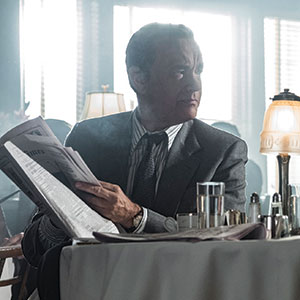

Attempting to start with a grabber, Steven Spielberg’s The Post opens on Vietnam in 1966. A typewriter-bearing Daniel Ellsberg (Matthew Rhys) has come to observe the troops. Ellsberg was a Marine vet himself, though this isn’t mentioned. Spielberg being Spielberg, there are some inspired visual touches right away: the reflection of tracers from rifle fire on the black camo war paint streaking Ellsberg’s face.
The trip to ‘Nam shows us the cost of the war, bringing context to the centerpiece of The Postthe New York Times and the Washington Post‘s publication in 1971 of the leaked Pentagon Papers. Ellsberg risked jail to unleash a decades-long secret history of deception, ass-covering and refusal to read the writing on the wall.
One can argue the worthiness of the war in Vietnam. What’s inarguable is the thousands of Pentagon documents here demonstrated that the public was kept in the dark by the Department of Defense and their hired strategists.
The Post studies the conflict between the gruff editor, Ben Bradlee (Tom Hanks, working a shaky Boston accent), and the Post‘s publisher, Katharine Graham (Meryl Streep)a patrician Washington widow who had the paper as her family business. The relatively small and “barely solvent” Post is about to be taken public on Wall Street. Moreover, she’s good friends with the people she needs to exposeincluding the long-serving secretary of defense, Robert McNamara (a well-cast Bruce Greenwood). The engineer of a war he knew was doomed, McNamara is described by Graham as “my most-trusted advisor.”
Graham’s side of the plot seems there mostly to have a woman in the pictureSarah Paulson has almost enough presence to fight the script’s uninteresting view of Mrs. Bradlee. Streep can’t make Graham’s personal heartbreak and portfolio problems as interesting as the story of how the news got out, how The Post was scooped by the New York Times on their own turf and how the revelations were almost blocked by President Richard Nixon and the courts.
Spielberg is never less than competent with the camera, keeping the situation in fluid motion. Even if you’d need to walk anyone under 50 through the facts of this case, The Post is first-rate newspaper porn, featuring views of the old Times headquarters, with its stained glass and globe lights. There’s some fun in the scenes of the shimmer of molten lead in the fonts, the earthquake rumble of the presses and the stacks of papers hurled off the trucks: this scene, a staple of film noir, is staged in a new way. The truckers miss the sidewalks and the bundles carom into the streets, making it a haphazard, urgent business. Spielberg winches up some tension as reporter Ben Bagdikian (Bob Odenkirk), later a revered journalism teacher at Berkeley, hunts Ellsberg, spilling quarters at the pay phone. It’s not often, but sometimes The Post does have a pulse.
Inarguable or not, the authenticity of the Pentagon Papers is being argued-Streep and Hanks are liberals, ergo, this story is liberal rubbish. All this, according to figments conjured online by Slavic server farms, or according to the minds of conservative citizens, who seem to possess about as much memory as Dory the Fish. The invaluable information in The Post is covered in more depth in Judith Ehrlich and Rick Goldsmith’s 2010 documentary, titled in honor of Henry Kissinger’s description of Ellsberg: The Most Dangerous Man in America.
It tells of Ellsberg’s decision to leak the documents and how this leak begat “the Plumbers,” Nixon’s counter-intelligence team, who inaugurated the Watergate affair. In 2010, I wrote, “A feature film would have handled this ending on a note of triumph; the full story is sadder.” Informed that the war had been conducted under false pretenses, the public didn’t care. They returned Nixon to office in a landslide for four more years. Exult at the end of The Post at the press’s triumph over the sinister Nixon … but if Lord Vader’s gone, we’ve certainly got Snoke to deal with.
The Post
PG-13, 130 Mins.
Valleywide


